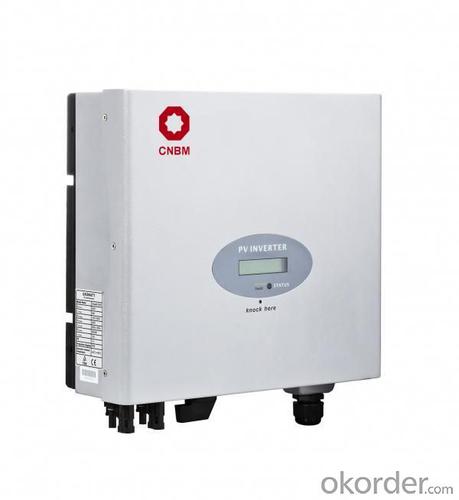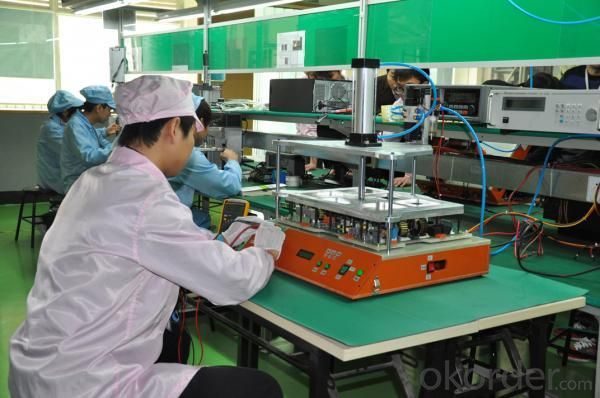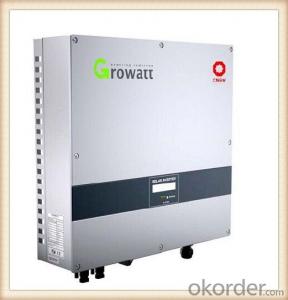DC to AC Solar Inverter CNBM-4000TL Grid Tied
- Loading Port:
- SHENZHEN
- Payment Terms:
- TT
- Min Order Qty:
- 1 set set
- Supply Capability:
- 5000 per month set/month
OKorder Service Pledge
OKorder Financial Service
You Might Also Like
Features of Grid Tied Solar Inverter CNBM-4000TL
Local and remote monitor network can be easily setup with optional RS232, RS485, ETHENET, GPRS or WIFI interface with Android, I-phone, I-Pad. Also, you can design and monitor your PV system using our PV system design software and monitor website.
The full range of CNBM single phase inverters has received VDE, CE, G83/1, G59/2, ENEL2010, VDE4105, C10/C11, AS4777 etc.
Maximum efficiency of 97.8% and wide input voltage range, Internal DCswitch,MTL-String, Sound control,Bluetooth/RF technology /Wi-FiTransformerless,GT topology
Technical data of Grid Tied Solar Inverter CNBM-4000TL
Model | CNBM-4000TL | CNBM-5000TL | |
Input data (DC) |
|
| |
Max. DC power | 4200W | 5200W | |
Max. DC voltage | 580V | 580V | |
Start voltage | 150V | 150V | |
PV voltage range | 100V-580V | 100V-580V | |
Max. input current | 20A/20A | 20A/20A | |
Number of MPP trackers /strings per MPP tracker | 1/3 | 1/3 | |
Output (AC) |
| ||
Rated AC output power | 3680W | 4600W | |
Max. AC power | 4000W | 4600W | |
Max. output current | 16A | 22.7A | |
Power factor | 1 | 1 | |
THDI | <3% | <3% | |
AC connection | Single phase | Single phase | |
Efficiency |
| ||
Max. efficiency | 97.8% | 97.8% | |
Euro weighted efficiency | 97.40% | 97.40% | |
MPPT efficiency | 99.50% | 99.50% | |
Protection devices |
| ||
Output over voltage protection-varistor | yes | yes | |
Ground fault monitoring | yes | yes | |
Grid monitoring | yes | yes | |
General Data |
| ||
Dimensions (W / H / D) in mm | 406/406/192 | 406/406/192 | |
Weight | 21KG | 21KG | |
Operating temperature range | –25°C ... +60°C | –25°C ... +60°C | |
Altitude | 2000m(6560ft) without derating | ||
Self-Consumption night | < 0.5 W | < 0.5 W | |
Topology | Transformerless | ||
Cooling concept | Natural | Natural | |
Environmental Protection Rating | IP65 | IP65 | |
Features |
| ||
DC connection | H4/MC4(opt) | H4/MC4(opt) | |
Display | LCD | LCD | |
Interfaces: RS485/RS232/Bluetooth / RF/Zigbee/Wifi | yes/yes/opt/opt/ | ||
Warranty: 5 years / 10 years | yes /opt | yes /opt | |
Certificates and approvals | CE、VDE 0126-1-1、DK5940、G83/1-1、G59/2、RD1663、EN50438、 | ||
CNBM-4000TL is simple national setting of line supply monitoring, Easy country configuration, with Multi-language,display, currently available for most of the countries over the world.With technical creativity and scientific management, the factory established first class R&D and test centers, as well as management and R&D teams comprising of PhDs and masters with overseas qualification.
Picture 1 factory of Grid Tied Solar Inverter CNBM-4000 TL
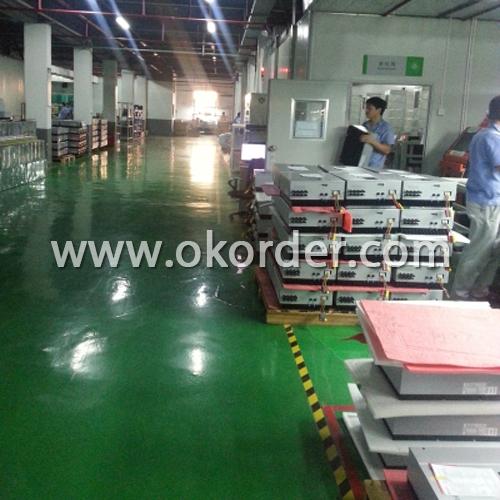
Picture 2 Package of Grid Tied Solar Inverter CNBM-4000TL
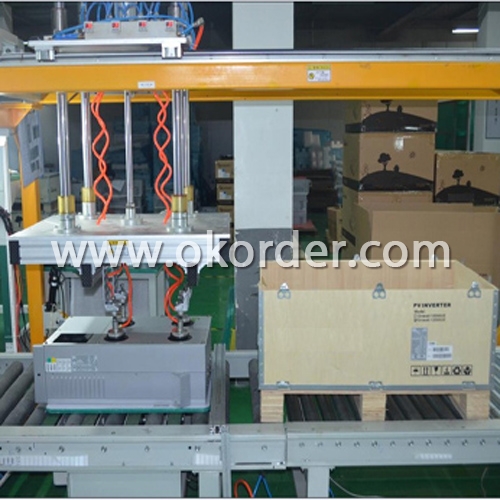
- Q: How does the input current rating affect the performance of a solar inverter?
- The input current rating of a solar inverter directly affects its performance as it determines the maximum amount of current that the inverter can handle from the solar panels. If the input current rating is too low, it may not be able to handle the full power output of the solar panels, leading to inefficiency and potential damage to the inverter. On the other hand, if the input current rating is too high, it may be overkill for the system, resulting in unnecessary costs. Therefore, selecting an appropriate input current rating is crucial for optimal performance and longevity of a solar inverter.
- Q: Can a solar inverter be used with a solar-powered educational system?
- Yes, a solar inverter can be used with a solar-powered educational system. A solar inverter is a device that converts the direct current (DC) generated by solar panels into alternating current (AC) that can be used to power various electrical devices. In the case of a solar-powered educational system, the solar inverter would play a crucial role in converting the DC power generated by the solar panels into usable AC power for running electronic equipment such as computers, projectors, and other educational tools.
- Q: Can a solar inverter be installed in a multi-storey building?
- Yes, a solar inverter can be installed in a multi-storey building. The installation of a solar inverter in a multi-storey building is possible and depends on various factors such as the availability of suitable roof space, electrical infrastructure, and compliance with local regulations. It is essential to consult with a professional solar installer to assess the feasibility and design a tailored solar energy system for the specific building.
- Q: Can a solar inverter be used in standalone power systems?
- Yes, a solar inverter can be used in standalone power systems. Standalone power systems, also known as off-grid systems, are not connected to the traditional electrical grid. In such systems, solar inverters convert the direct current (DC) generated by solar panels into alternating current (AC) that can be used to power various electrical devices and appliances. The solar inverter is an essential component in standalone power systems as it enables the efficient utilization of solar energy for off-grid applications.
- Q: How does the efficiency of a solar inverter affect the overall system performance?
- The efficiency of a solar inverter plays a crucial role in determining the overall performance of a solar system. A higher efficiency inverter converts a greater percentage of the energy generated by the solar panels into usable electricity. This means that less energy is lost as heat, resulting in more electricity being available for consumption. A more efficient inverter translates into increased energy production, reduced reliance on grid power, and ultimately, higher cost savings. Additionally, a highly efficient inverter enhances the stability and reliability of the system, ensuring optimal performance and longevity.
- Q: Can a solar inverter be installed outdoors?
- Yes, a solar inverter can be installed outdoors. However, it is important to ensure that the inverter is designed to be weatherproof and can withstand the elements. Additionally, proper ventilation and protection from direct sunlight should be considered when installing the inverter outdoors.
- Q: Can a solar inverter be used in a building-integrated photovoltaic system?
- Yes, a solar inverter can be used in a building-integrated photovoltaic (BIPV) system. The solar inverter is an essential component in a BIPV system as it converts the direct current (DC) generated by the photovoltaic panels into alternating current (AC) that can be used to power the building's electrical loads or fed back into the grid.
- Q: How does a solar inverter handle temperature variations?
- A solar inverter handles temperature variations by employing various cooling mechanisms such as heat sinks, fans, or liquid cooling systems. These components help dissipate excess heat generated during operation, ensuring the inverter remains within its optimal temperature range. Additionally, advanced inverters are equipped with temperature sensors that continuously monitor the internal temperature and adjust the system's performance to maintain efficiency and protect against overheating.
- Q: Can a solar inverter be used with different types of grid connection standards?
- Yes, a solar inverter can be used with different types of grid connection standards as long as it is designed to meet the specific requirements of those standards. The inverter must be compatible with the voltage, frequency, and other technical specifications of the grid in order to ensure safe and efficient operation of the solar power system.
- Q: Can a solar inverter be used with solar-powered water purification systems?
- Yes, a solar inverter can be used with solar-powered water purification systems. A solar inverter is responsible for converting the direct current (DC) power generated by solar panels into the alternating current (AC) power required for most electrical devices. Since water purification systems often require AC power to operate, integrating a solar inverter allows the system to utilize the energy harnessed from solar panels efficiently.
Send your message to us
DC to AC Solar Inverter CNBM-4000TL Grid Tied
- Loading Port:
- SHENZHEN
- Payment Terms:
- TT
- Min Order Qty:
- 1 set set
- Supply Capability:
- 5000 per month set/month
OKorder Service Pledge
OKorder Financial Service
Similar products
Hot products
Hot Searches
Related keywords



